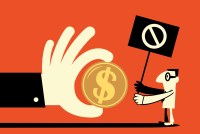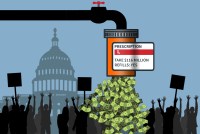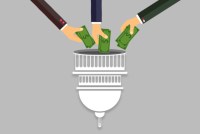Federal Grants ‘A Lifesaver’ In Opioid Fight, But States Still Struggle To Curb Meth
The federal government has doled out at least $2.4 billion in state grants since 2017 to address the opioid epidemic, which killed 47,600 people in the U.S. that year alone. But local officials note that drug abuse problems seldom involve only one substance.
Short-Staffed Nursing Homes See Drop In Medicare Ratings
In its latest update to the Nursing Home Compare website, the government gave 1,638 homes its lowest star rating for staffing — one star on its five-star scale. Most were downgraded because payroll records reported no registered-nurse hours at all for at least four days.
Big Pharma Gave Money To Patient Advocacy Groups Opposing Medicare Changes
A KHN database shows that $58 million flowed from drugmakers to patient groups running national ads.
Avoidable Sepsis Infections Send Thousands Of Seniors To Gruesome Deaths
No one tracks sepsis cases closely enough to know how often these severe infections turn fatal. But the toll — both human and financial — is enormous, finds an investigation by KHN and the Chicago Tribune.
1,400 Nursing Homes Get Lower Medicare Ratings Because Of Staffing Concerns
Medicare said those homes either lacked a registered nurse for “a high number of days” over three months, provided data the government couldn’t verify or didn’t supply their payroll data at all.
How A Drug Company Under Pressure For High Prices Ratchets Up Political Activity
Denmark-based drugmaker Novo Nordisk has invested more in lobbying and doubled political donations since 2015.
Patient Advocacy Groups Take In Millions From Drugmakers. Is There A Payback?
Kaiser Health News launches “Pre$cription for Power,” a groundbreaking database to expose Big Pharma’s ties to patient groups.
Liquid Gold: Pain Doctors Soak Up Profits By Screening Urine For Drugs
With the nation’s opioid crisis, urine testing has become a booming business and is especially lucrative for doctors who operate their own labs, a Kaiser Health News investigation finds. And dozens of practitioners have earned “the lion’s share” of their Medicare income exclusively from urine drug screens.
Right After Trump Blamed High Drug Prices On Campaign Cash, Drugmakers Gave More
At a political rally in March, President Donald Trump said drug prices are “outrageous” and blamed campaign contributions. Drugmakers funneled nearly $280,000 to Congress the very next day.
Follow The Money: Drugmakers Deploy Political Cash As Prices And Anger Mount
Embattled opioid seller Mallinckrodt is one of many pharmaceutical companies boosting political contributions and lobbying on Capitol Hill.
With Drug Costs In Crosshairs, Health Firms Gave Generously To Trump’s Inauguration
Led by Pfizer and Amgen, about 10 health care firms contributed to President Donald Trump’s inauguration, which earned them entry into private events with the president and vice president.
Enfermos… ¿y en bancarrota? Consumidores gastarán más en drogas en 2017
En 2017, muchos más planes de salud en los mercados de seguros requerirán que los consumidores paguen una sustancial parte del costo de los medicamentos más caros, dicen, para disuadir a pacientes muy enfermos de elegir sus planes.
Need Pricey Drugs From An Obamacare Plan? You’ll Shoulder More Of The Cost
A Kaiser Health News analysis finds that the portion of federal marketplace plans requiring people to pay a third or more of the cost of specialty drugs have jumped from 37 to 63 percent since 2014.


















